A NEW GREENHOUSE AND A BIGGER GARDEN
Last year we erected a lean-to greenhouse at the back of the workshop. There were two reasons: Firstly, to store delicate plants over the winter and secondly to keep the west winds off the back door of the workshop and thus keep the place a bit warmer for working in. Whilst the workshop is well insulated, there is no heating in there and it can get a bit parky in the winter.
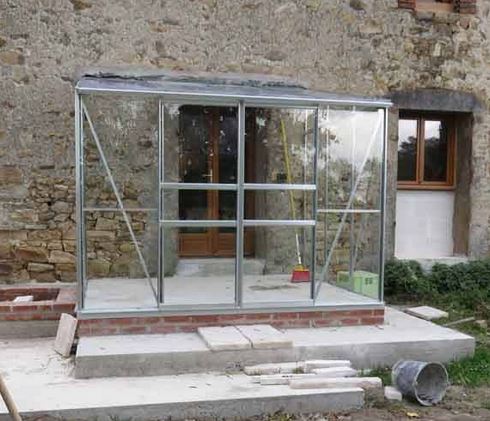
The greenhouse was a simple aluminium and glass affair, with polycarbonate roof panels; the whole thing being held together by glazing clips.
We filled it with plants and patted ourselves on the back for another successful project. But mother nature had other ideas.
Come the autumn and a big storm blew in from the Bay of Biscay, via La Rochelle. Every pane of glass was smashed and plants were blown all over the place. Polycarbonate panels had drifted into the garden next door and the sliding doors were twisted and sagging.

After clearing up the mess, it was obvious that a design re-think was called for.
A couple of hours with Sketchup produced a new design; a wooden frame with store-bought windows, doors and skylights and, most importantly, a solid tiled roof that the wind could not get under.
A local English builder, Mark Slee, was recommended to us by a friend and he gave us a very reasonable quote for constructing what we were now beginning to call the conservatory. I ordered some 400 kilos of well dried Landes pine, with the main beams being 90mm x 90mm in section and ordered up the doors and windows from Lapeyre, our go-to supplier for ready-made timber products.
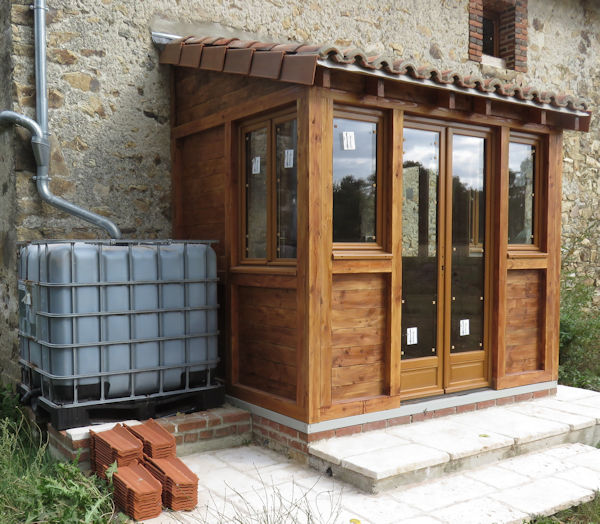
A few weeks later, here is the final building.
Cami has decided that it would be a nice place for her and our neighbour Yvette to take their afternoon tea, so is sourcing a bistro table and some chairs.
There is electricity in there, so it looks like it is all set to become the Teahouse of the Autumn Storm and the plants will just have to shiver outside.
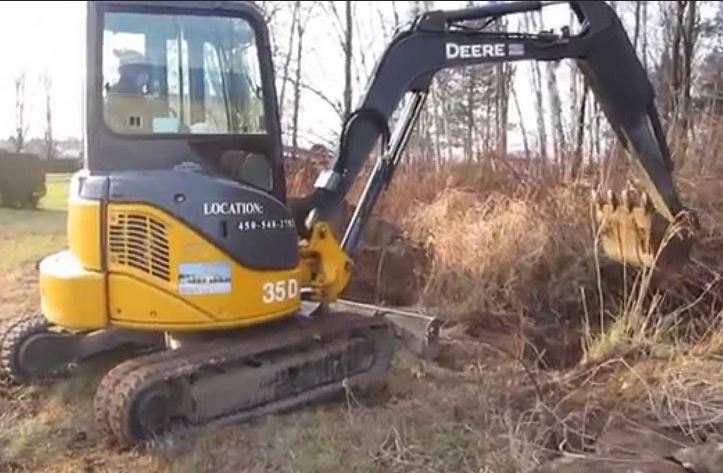
Whilst Mark was working on the building, I noticed that he also offered the services of a mini-digger, called a mini-pelle in France.
This is what one looks like and this one is doing exactly what we got Mark to do, grub out a load of old bushes and brambles at the bottom of the garden
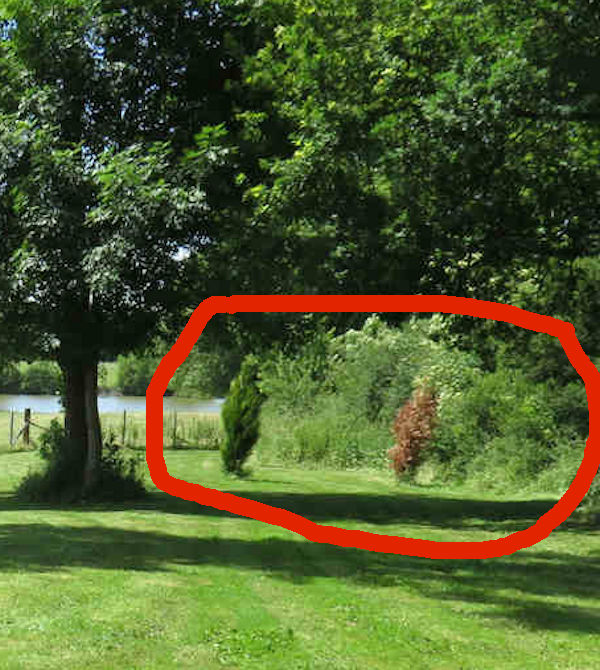
This is the tangle of old growth that we needed removed, marked in red.
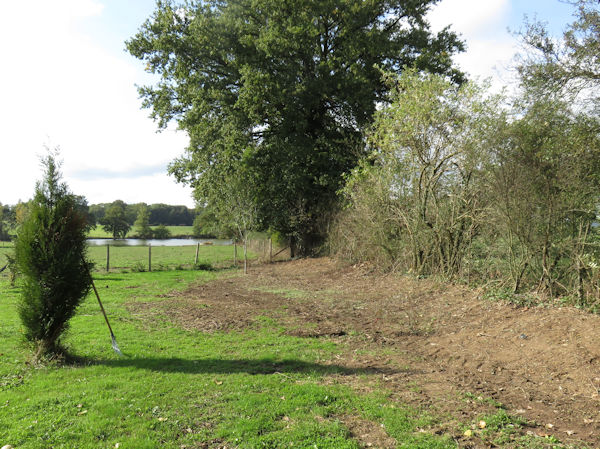
And here is the cleared ground. It has added some 150 square metres to the garden, which will eventually contain fruit trees, but in the first instance will just be continually mowed to encourage grass growth.
A BUDGET DEAL
We have lived in France for five years now, so I thought it was time for a progress report. How has reality stacked up against my expectations? What have I achieved and what have I failed at? Over the next few updates, I am going to muse over the successes and failures and in this first part, I am going to describe something I think I got right and that is the budgeting system I developed. But first a quick introduction.
It was a classic Brit move; retire to somewhere a bit warmer and renovate an old house to create a cosy retirement nest. However, it was carefully thought through and even more carefully budgeted. I have never bought a house for cash before, but I considered that to be the first essential. The mortgage on our English house had been paid off some years before and we had no other debts. As pensioners, I wanted to keep it that way. We both had tax free lump sums available at the point of retirement. Mine was spent on enlarging our house in England and Cami's was spent on buying the French house. It cost us €50,000 for a property of some 120 square metres on the ground floor and a similar space for development in the loft. This compares with some 130 square metres over two floors in our English house, which is currently valued at some ten times the amount.
The house we bought is a nineteenth century farm cottage, built of granite and earth, with huge oak beams holding it roughly square and had not been lived in for three years before we moved in. It had been the home of the parents of our next-door neighbours and had last been "improved" sometime in the nineteen sixties. Excellent, plenty of hard work necessary to knock it into shape.
I calculated four years and €100,000 to complete the job. I think at this point I am about three years out on the completion time, but the cost is coming in roughly on song.
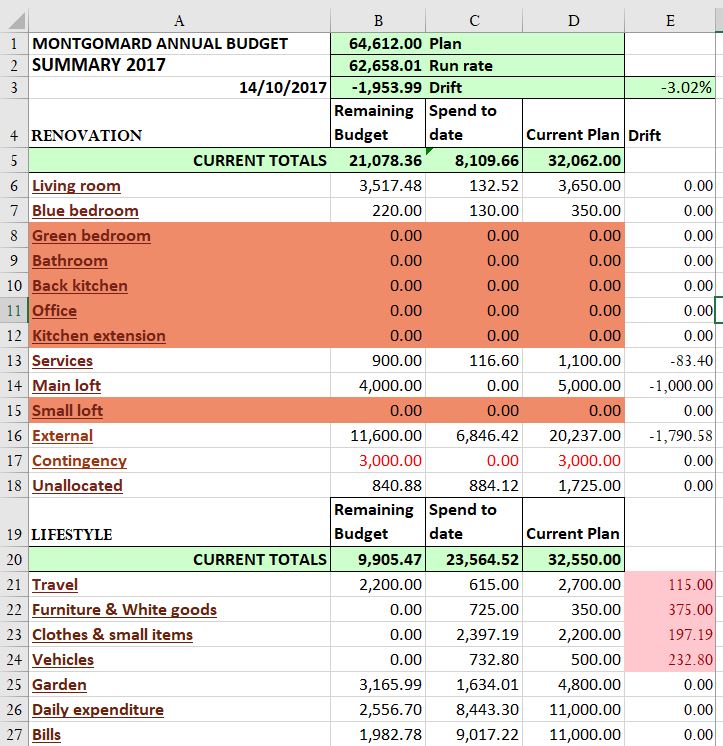
Because we have an income that, whilst comfortable, is limited, I am very careful in costing the jobs that we have undertaken.
On the left you can see the summary page for the 2017 budget, showing the position, in Euros, as at the middle of October. It is split into two, renovation and day to day living and each line on the summary pulls figures through from a detail page. Those lines shaded brown are where expenditure is finished for the year
The contingency figure of €3,000 is some 10% of the renovation budget, a figure I feel comfortable with although, after five years of accurate budgeting, I could probably shave that somewhat. Particularly as there is always our rainy-day stash if things get tight.
If you look at the "Main loft" line, it looks odd. A plan of €5,000, no spend yet and a remaining budget of €4,000. If we look at the detail page all will become clear.
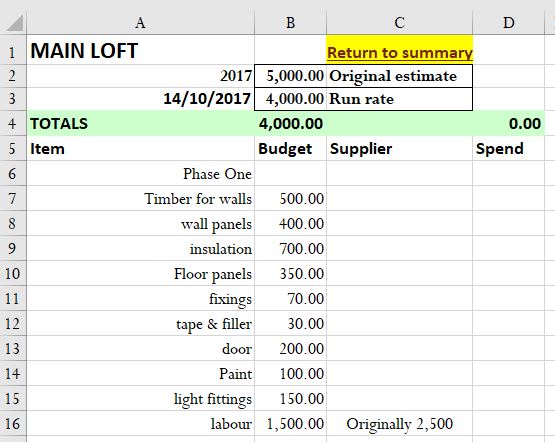
At the moment, the floor of the unrenovated loft is piled high with insulation to keep the heat from rising out of the ground floor. Knocking a large hole in that floor for the new internal staircase that we are building, will severely damage its insulating properties. So, this year's work is to build an insulated box at the top of the new staircase, with a door out into the main loft.
Eventually, the loft will become a library, third bedroom and second bathroom, but that is for another budget. The point of showing you this budget is so that you can see how the budget changes to reflect reality. After looking at the time I thought it would take me to complete the job, I put in €2,500 for labour. We sent out for estimates and the one we accepted came back as €1,500. Now, listen carefully, I shall say this only once.
The "TOTALS" row has two figures. The total spend so far, a simple addition and the remaining budget so far, which is the sum of the individual budget lines minus the total spend. If any individual budget lines change, as labour has in this example, or if actual spend figures are added, then the total available budget will change. The run rate is the figure we expect to spend once everything is finished and this is affected by changes in available budget and actual spend but, and this is important, the original estimate figure above it never changes, once the budget is agreed. The final piece of the puzzle is that when spend on a line is complete, the budget figure is changed to match it. In the final analysis, the budget must equal the actual spend and thus the remaining budget must end up as zero.
If you have missed some of the nuances of this rambling description of my budgeting system, don't worry, there are only two points to remember.
- The initial plan is cast in stone, so that you always know how you are doing against your expectations. This avoids nasty surprises.
- Any or all outstanding items can be altered to reflect reality, without compromising your ability to compare it to plan.
It may seem like a lot of work, but once the spreadsheet is developed and tested, keeping it updated is a quick and simple activity, which just becomes part of a daily routine for a well organised renovator.
NO SPEAKA DE LANGUAGE
One of the things I have failed completely at since moving to France is becoming fluent in the French language. There are two reasons for this. Firstly, I am going deaf, so I cannot hear clearly what is being said to me in person or what is being broadcast electronically. Secondly, I have always been the laziest student on the planet.
I started research of the problem of developing deafness, but there is a confusing array of solutions being offered. I have tried using headphones whilst watching tele, but they didn't seem to make the sounds very much clearer and, after a while, my ears got hot and ticklish.
When I was young, my mother would wash out my ears with warm olive oil as she said that wax was blocking them, so the first step was get someone to peer into my shell-likes to see if they are blocked. Cami had to go to the doctors, so I tagged along and got him to make use of his ear magnifier. "No sign of any wax blockage, you're just deaf." Gee thanks doc. So he gave me a letter for the ear specialist in Bellac. This gentleman, after getting me to listen to some humming sounds, declared that I have lost 30% of my hearing, which is just on the edge of needing a hearing aid.

I now have another letter, this time for the hearing aid shop and they will give me some sort of ear-trumpet on free trial for a month.
The second problem could be more difficult to solve. I have usually found tests fairly easy to pass, largely because I seem to understand what testers are looking for. School tests, driving tests, marksmanship tests, anything that does not involve music I seem to be able to master. But, and this is important, I have never tried to be the best at anything. For me, just scraping through the pass mark is success. Allied to this, I have the attention span of a Mayfly. Thirty seconds after sitting down to study, I am distracted by something and some one minute later, my distraction is distracted by something else. After a few moments, I am in a universe far removed from that which I was trying to study.
I have picked up a number of computer languages in my travels: C, C++, BASIC, HTML, PHP, SQL and a smattering of FORTRAN, so how difficult could French be? But no one ever asks you to speak in HTML and the grammar of computer languages is simple and totally regular.
I guess I was hoping the I would pick up French by some sort of osmosis as a result of living here, but that has not really happened. I do have a fairly good vocabulary and, as a result, can read newspapers and magazines reasonably well, but in conversation I am about at the level of a six year old as I have not mastered the grammar of the language sufficiently to construct it as I go along. So, for the first time in my life, I may be forced to study seriously, quel horreur.
I GREW UP
I grew up in the arms of a loving family and a supportive extended family in South London and Surrey in the nineteen fifties. I was born a couple of months before D Day weighing just 4 lb., which was very small for those days.

I played with my friends on bomb sites, chasing rats through the London clay that had been thrown up by explosions. My father was a bus conductor, clipping cardboard tickets that he took from a wooden rack, slung from his neck on a leather strap. I occasionally sat on his bus and was given a ticket like everyone else, but I never had to pay. He paid for me.
He was not a big man, wiry I suppose you would call him, muscles and veins stood out on his arms, but he had an aura, perhaps charisma. One of my cousins, notorious for his behaviour, was always very polite in uncle Charlie's presence. I admired my father, but was always slightly afraid of him. He only ever hit me once and I cried. Not because he was hitting me, but because he was holding the top of my head against one of the brass buckles of his braces, which really hurt. He pushed me aside when he heard me cry and only talked to me again once my mother had explained what had happened. I am sure he loved me, not in the soppy way that he loved my sisters who could do no wrong, but with some sort of fierce pride, which demanded that I be a real man.
I have no idea whether I became a real man in his eyes because he died when I was eleven and his death led to my first experience of social injustice. He had complained of stomach pains for some time, but both the doctors in the surgery he attended said that there was nothing wrong with him. Eventually, they said that it was all in his head and sent him to a mental hospital. After two days of observation, a psychiatrist diagnosed a massive cancer of the stomach and he died a week later of "kidney failure", no way were they going to mention cancer. My mother took a case against his doctors via the British Medical Association and I helped her prepare her case. Twenty foolscap pages of notes and testimony. My knowledge of English grammar, whilst not great, was better than hers, so we worked on it together over many evenings.
This was 1956, so to present it, she had to appear before a BMA committee, without a legal representative and without anyone to support her. Alone against a bunch of bastards; I am sure she gave her all and stood her ground against them, but the result was as I expected. There was no blame on the doctors who had diagnosed cancer as mental disturbance. She always refused to speak about what had happened in the meeting, but doctors were never high on her list of trusted people. Funnily, for completely different reasons, they are not high on my list either. I don't think that my lifetime adherence to radical politics resulted from this, but it must have had some effect.
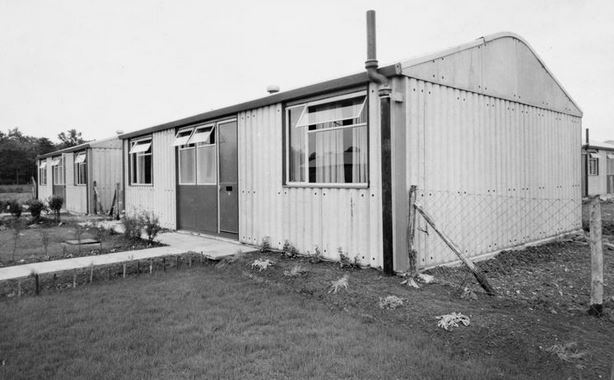
The other thing that you need to know about my childhood is that I grew up thinking it was quite natural to be home owners. Our original rented home was bombed and my mother and I were evacuated to somewhere up north. Like many Londoners, we went back as soon as possible and lodged with relatives. After the war, we were housed in a temporary prefab. There were thousands of these erected and they could be put up at the rate of over 1.5 per site, per day.
All the interior decoration was green woodwork and cream walls which was horrible, but they were well fitted out for the time, with a back boiler attached to the coal fire for hot water and fitted gas ovens and fridges. After some years of scrimping and scraping and with some financial help from an uncle, we moved into our first owned house, a completely dilapidated terraced house in Streatham vale, whose previous owner had died some time earlier. After a shedload more green and cream paint and some construction help from a brother-in-law, who was a builder, my parents settled down, with myself and my sister.

A second sister, some years later led us to move to a three bedroomed end of terrace house in Sutton and I found a picture of that house on an estate agent's web site.

Sutton was at the time firmly in Surrey, unlike now, when it is another extension of London, so we were moving out, not just to the suburbs, but to the border of the suburbs and the countryside. We often took a Greenline bus (the countryside arm of London Transport) out to Box Hill. The highest point of the North Downs. Us kids would roll down the hill whilst the adults picked Blackberries for making jam.
So, like millions of people before me and since, I grew up. I have no idea whether I grew up well or badly, because, in those days we had no measure of such things. The fact that I survived was considered a plus for the people who counted things. I was bullied because I was small, but I can't say I suffered from bullying. Once I was hit a couple of times, I realised that it didn't actually hurt as much as I thought it would. I took boxing lessons at school and, whilst never very good at it, it did teach me to accurately weigh up anyone I might meet just by looking at them.
So, I grew up, not with any plan, not according to any regime, but whatever I am now is a result of me growing up.